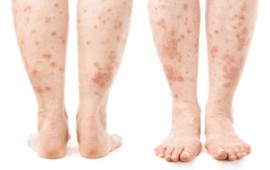Tips on Controlling Psoriasis
Author: Shannon Miller Lifestyle

Close to 125 million people worldwide, that is 2 to 3 percent of the total population have psoriasis, according to the World Psoriasis Day consortium.
Psoriasis is chronic skin disease. A person with psoriasis generally has patches of raised red skin with thick silvery scales. The affected skin may be red and scaly or have pustules, depending on the type of psoriasis the individual has.
Psoriasis is typically found on the arms, legs, trunk, nails, or scalp, but psoriasis may be found on any part of the skin. The most commonly affected areas are the knees and elbows. It can be painful, itchy, and frustrating, but –
there are things you can do to help calm your inflamed skin, remove psoriatic scales, and reduce itching:
- “The best strategy for dealing with psoriasis is developing a treatment plan with your dermatologist and sticking with it,” says Daniel Kaplan, MD, PhD, a dermatologist and an assistant professor at the University of Minnesota.
- Self-help treatments don’t work for everyone with psoriasis, but according to Kaplan, moisturizer can help soothe dry, scaling, or inflamed skin.
- Psoriasis can be extremely itchy, but you have to try and not scratch. Refraining from scratching can be difficult, but try keeping your nails trimmed and, if necessary, sleep with gloves on. “And don’t use a brush or any other implement to scratch your skin. It can make lesions even worse,” says Kaplan.
- The American Academy of Dermatology (AAD) recommends a balanced diet if you have psoriasis.
- Maintaining a heart-healthy lifestyle will help keep your mind and body in good shape.
- No Smoking! According to experts at the AAD, research suggests that smoking may trigger or aggravate psoriasis, increase its severity, lower remission rates, and interfere with some treatments.
- No Drinking! The AAD cites research suggesting that drinking alcohol may raise your risk of developing psoriasis. If you already have psoriasis, alcohol may hinder your potential for remission or worsen the severity of your condition.
- Many experts recommend tracking psoriasis triggers and flare-ups as a way to identify the causes of your psoriasis outbreaks. Once you do identify a trigger for a recent flare-up, do what you can to minimize or avoid the trigger.
- If you feel that your psoriasis seems to flare up because of stress, you may try exercising, meditating, or working with a counselor to relieve some of the effects of that stress.
- Dermatologists at the AAD recommend taking short, warm, not hot, baths and showers and using fragrance-free cleansers. To calm inflamed skin, experts at the Mayo Clinic suggest soaking for at least 15 minutes per day in a bath that contains bath oils, oiled oatmeal, Epsom salts, or Dead Sea salts. After bathing, blot the skin dry rather than rubbing, and liberally apply thick moisturizing ointments or oils.
TIP: With this condition you really have to focus on a healthy lifestyle as much as possible. First and foremost working closely with your dermatologist, eating right, exercising,reduce stress and getting support when needed are all things that point you in the right direction.
Source: everydayhealth.com
